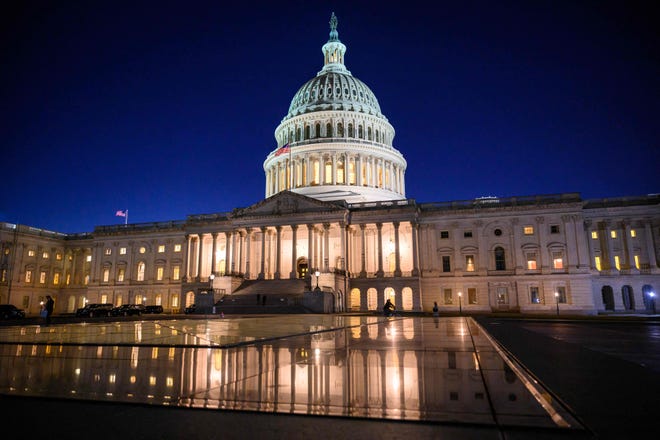
On Tuesday, the Biden administration promised that hundreds of thousands more students than it originally thought would qualify for federal financial aid to pay for college this year.
By Thursday, that promise had disappeared.
Congress slapped it down, as lawmakers squabbled to reach an agreement on a temporary measure to keep the federal government’s lights on.
Some lawmakers accused the Biden administration of overstepping its authority. The Education Department said it was just trying to give more help to families who need it.
The blame game is only stressing colleges out more, after the people who put together financial aid offers spent a week in limbo because of all the political back-and-forth.
Some, including Karen McCarthy, the vice president of the National Association for Student Financial Aid Administrators, worry the turmoil in Washington might only end up delaying financial aid offers to students even further over the coming months.
“They’re all scrambling to figure out what their plan is now,” she said, referring to the software providers that work with colleges, during a podcast interview this week.
The quiet battle among congressional budget experts was prompted by a sudden request from the Biden administration on Monday. The Education Department abruptly briefed them that the agency planned to direct billions of additional dollars next year to the federal Pell grant program. Pell grants help low-income families pay for college.
The move would have increased financial aid for potentially hundreds of thousands. But it also would have quickly depleted Congress’ reserves for the program, threatening that same aid in the years to come.
Money for that program was already disappearing – and fast. New research published just last week suggested Congress’ Pell coffers would run dry by 2026, endangering financial help for millions. The new demand would’ve required Congress to pass more funding by later this year amid a presidential election, when federal lawmakers often sit on their hands.
Some congressional staffers felt blindsided. By the time the news got around Congress on Thursday, Rep. Virginia Foxx, R-N.C., the chairwoman of the House education committee, derided the Education Department for what she called an “11th hour” demand with the potential to “cripple the Pell Grant program by creating a $7 billion funding gap.”
It was part and parcel, in Foxx’s mind, of the agency’s “botched” rollout of the new Free Application for Federal Student Aid, or FAFSA.
In recent months, criticism of the Biden administration over the FAFSA has been a rare area of bipartisan agreement. Though the form is used by millions of students and parents annually, the Education Department’s computer systems for it haven’t been fully modernized in decades. In 2019, a federal watchdog was sounding the alarm about it, and not long after, Congress passed a bipartisan law to streamline the form, hoping to get money for school into the hands of families who needed it.
Yet since then, technical errors and unforeseen delays have left broad swaths of students and colleges feeling whiplash. This week was no different.
Read more:Millions of students may have just weeks to compare college financial aid offers
The Education Department unexpectedly said Tuesday it came across a mistake in the roughly three-year-old law. Because of the oversight, the agency said it had been short-changing a broad swath of students. That morning, Education Secretary Miguel Cardona announced new “technical updates” to the form, but he was vague on the details.
Questions immediately started to swirl in the higher ed community, and in Washington, about whether the department was overstepping its authority to fix the error, or whether Congress had to pass a new law.
Everything changed by Thursday. After days of congressional negotiations, President Joe Biden signed a stopgap spending measure that, while keeping the federal government’s lights on for a few more weeks, also reversed his own education secretary’s announcement from just a few days earlier. It set aside about $8 billion for the Pell program, protecting its funding through 2027, but at lower levels than what the Biden administration was intending.
Read more:Congress passes short-term deal to avert partial government shutdown
As the dust settled, everyone seemed to be a little miffed – Democrats with the end result, and Republicans with how the Biden administration went about it.
“I am extremely disappointed in this outcome,” said Rep. Bobby Scott, D-Va., in a statement Thursday. Sen. Bernie Sanders, I-Vt., said the same thing.
The debacle hasn’t done anything to bolster the already-tenuous level of trust between the federal government and college officials across the country, many of whom have spent the last few months pulling their hair out amid a barrage of problems with the new FAFSA.
And it’s only further evidence of just how unpredictable – and political – the rollout has become, even as the Education Department is insisting the back-and-forth won’t delay things any further.
“The Department’s top priority continues to be making sure that all students can access the maximum financial aid that they are entitled to under the law,” an Education Department spokesperson said in a statement. “We are committed to implementing the FAFSA Simplification Act as written by Congress and will implement this update without any changes to our implementation timeline.”
Some people aren’t persuaded, according to Jon Fansmith, the senior vice president for government relations at the American Council on Education, higher ed’s top advocacy group.
“It sort of feels like when a kid proactively says I didn’t do something,” he said in an interview. “You absolutely did it then.”
Bryce McKibben, who helped draft the legislation that passed in 2020, commended Congress for coming up with a solution on a quick timeline.
“This bill provides a timely fix to an inadvertent drafting error in the FAFSA Simplification Act which, left unaddressed, could have exacerbated a looming Pell Grant shortfall,” he wrote on X.
Short-term Pell bill indefinitely stalled
The disarray also appeared to help pump the brakes on another bill to expand college financial aid.
The Bipartisan Workforce Pell Act, which is supported by both Scott and Foxx, was originally set to hit the House floor this week. It would extend Pell grants to college programs as short as eight weeks.
Supporters of the legislation say it’s “desperately needed” and would help low-income students afford tuition for technical classes in trades like welding.
Opponents say many of those types of short-term programs, even just 15 weeks long, are already eligible for Pell grant funding. Under the bill, even online-only programs would qualify for the vouchers. If it became law, critics say for-profit colleges would ultimately use the new money as an opportunity to take advantage of vulnerable students.
“It’s really hard to imagine an 8-week program that’s going to give you access to the middle class,” said Rachel Fishman, the acting director of the education policy program at the think tank New America.
Dissent over bold proposals to pay for the bill have left some of higher ed’s biggest lobbying groups vocally against the measure – at least as it’s currently written.
It’s unclear when the legislation might be considered again.
Zachary Schermele covers education and breaking news for USA TODAY. You can reach him by email at [email protected]. Follow him on X at @ZachSchermele.

















